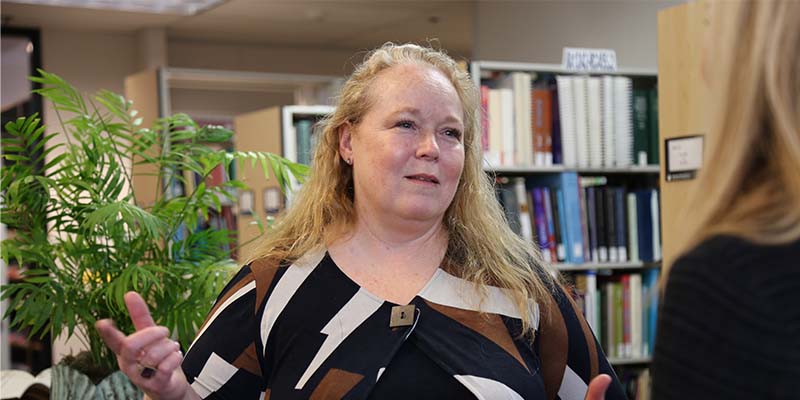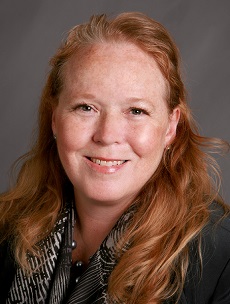CHR Director Lucy Savitz is Homeward Bound
Stories - August 5, 2022

After five years as the Director of the Kaiser Permanente Center for Health Research (CHR) and Vice President for Health Research at KPNW, Lucy Savitz, PhD, MBA, is stepping down for family reasons. Dr. Savitz will move to Pittsburgh, Pennsylvania, her hometown, where she will join the faculty at the University of Pittsburgh School of Public Health, in the Department of Health Policy and Management. She will also serve as a senior consultant to the UPMC Center for High Value Health Care.
In July, Dr. Savitz sat down for an interview to reflect on her time at CHR.
Since early 2020, you’ve steered CHR through a global pandemic, including a transition to a mostly remote work force. Can you talk about some of the challenges?
Nobody's written the book on how to lead an organization through a pandemic. Everybody was pretty much flying by the seat of their pants, frankly. I hope I did a good job; but I did not do it alone. A lot of what makes CHR great is its community of people. What the pandemic did was isolate us all and really break down or put cracks in that community. I think that's been really hard on everyone. I am incredibly proud of the work everybody's done, even people who are socially introverted, for example, and people who are not comfortable with technology, like me.
We've all become adaptable and flexible, and we've maintained our work and the scientific stature of our work despite the incredible odds that we faced. So, it's taken everybody working together. It's taken the IT team. It's taken people individually. It's taken teams and leaders to revamp plans. And I just think we couldn't have done it without each other.
One of your biggest priorities has been transforming the KPNW region (health plan, hospitals, dental, and medical group) into a Learning Health System. As you think back, what work are you most proud of?

Lucy Savitz
Well, I’m most proud of testimonials from various people on the KPNW senior leadership team and our medical and dental groups. CHR’s been around for nearly 60 years, and for most of that time the research being done was very much siloed and somewhat separate from the health delivery system.
It used to be that CHR was seen as this thing that happened “over there,” and nobody really knew what “it” was or what we did. And now more than ever before they know about us. They know about our importance, and we've delivered to them. We can supply answers to questions that they couldn't have otherwise had, and so increasingly they now see a value.
And that's what learning health system science is. It's taking the tools and rigors of research and applying them to answer operational questions. I'm very proud of that.
As part of that work, we built the infrastructure to be able to solicit requests from regional operations and then report to senior leadership on our progress. So, our health system leaders see the value in the LHS Program on a quarterly basis. And we're in the process of writing up a paper for the peer reviewed literature that describes how we built that infrastructure.
Our learning health system work is also a legacy of something that will be left behind. Britta Torgrimson-Ojerio (PhD, RN) is going to take over my role in that.
What part of your research portfolio is most important to you?
The work that I do as an implementation scientist and health services researcher. If you ask people, who's Lucy Savitz, they say she's a learning health system scientist and a thought leader in the nation around that topic. My work sits at the intersection of research, practice, and policy. And I'm heavily activated in these areas.
But it's not just about the work that I lead, because I'm at a stage in my career where I don't need to be the PI. I’m trying to elevate others. A lot of the work I do is collaborative across organizational lines. I'm trying to make sure that there's a place to publish this kind of research, and that there continues to be funding for this kind of research. So, it’s more of an advocacy, mentoring, supporting role. In terms of training, I'll still be the co-principal investigator with Oregon Health and Sciences University for the Learning Health Systems K12 Training program, in my senior affiliate investigator capacity with CHR.
What do you see as CHR’s strengths?
Our diversified portfolio, and our ability to bring in new talent and strengthen the existing infrastructure of investigators will be key.
The other thing that I've tried to do in communicating across the region and across KP and elsewhere is to really develop an elevator speech about how the work we do is aligned with their priorities. Because nobody's really ever taken the time to say, “OK, it's a priority of the five-year plan for KPNW Hospitals and Health Plans to focus on cancer.” Well, we do cancer research, but nobody's ever said here's the cancer research we're doing and here's how it impacts what you’re doing.
Through the pandemic, I was also able to bring CHR Investigator Mark Schmidt (PhD, MPH) forward and Mark now sits on the regional COVID forecasting team with me. We provide weekly updates to the region. So, there's really high visibility for the operational utility of our work. And I think that's another success factor in how we relate to the care delivery system and the extent to which they support us, which we need.
What are you most looking forward to in your next chapter?
Being home to help my mom. You know, trying to help manage my mother's health from here has been very, very difficult. People call me and say, this is what the doctor said. And I'm like, “that makes absolutely no sense.” It's very frustrating. And so being there, I can intervene in ways that I just physically can't do from here. That's what I'm most looking forward to.
I think the other thing I’m looking forward to is that I’ll be teaching at the University of Pittsburgh, and that’s like going full circle for me. My educational and career journey started with the fact that my father didn't believe that women should go to college, and he would not support me. I was the black sheep of my family because I was supposed to become a secretary, marry a businessman and have babies. And that was it. And I had learned from somebody that if you worked for a hospital, you could go to college for $5 a credit at night. So, I actually worked at UPMC health system in their psychiatric hospital, worked full time during the day as a secretary and at night I went to school--I started my undergraduate degree at the University of Pittsburgh.
What will you miss most about this place?
The people. I've developed incredibly deep, personal, and treasured professional relationships with people. And this is not a job that the Director does alone. I worked with a lot of people and any success I had is because of working with other people, not because I did something alone. This job has truly been the capstone of my career. I love my work here. I love the people. I feel like we made a difference, and this was a very difficult decision because of that for me.